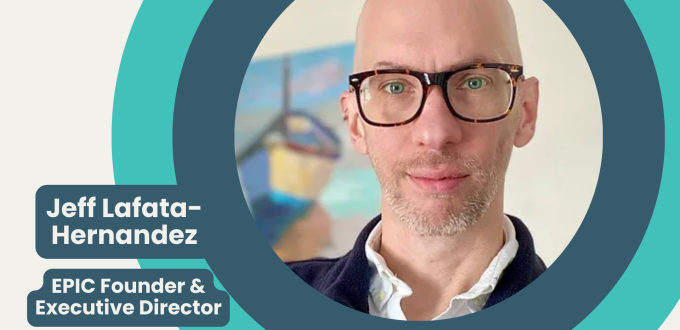On October 28, DEAR welcomed Jeff Lafata-Hernandez, founder of Empowering People for Inclusive Communities (EPIC), an organization dedicated to preparing young people with disabilities to be actively engaged community leaders while eliminating ableism to foster inclusive environments. EPIC hosts multifaceted programs, including the EPIC Service Warriors, a one year community service development program for youth with disabilities, as well as training and consulting workshops to address ableism and support for individuals with disabilities in the workplace.
Lafata-Hernandez delivered an educational training centered around EPIC’s core principles with a discussion exploring perspectives and forms of dialogue and support that will promote safe and equitable environments. Trainings and modules exploring these topics are essential as they are often left out of DEI programs, leading 76% of individuals to hide their disabilities in the workplace. These trainings are the first step towards creating strengthening inclusion, uplifting self-advocacy, and enhancing visibility.
The training opened with a conversation about how disability is defined, going over the American Disabilities Act of 1990 which states that an individual with a disability is a person who has a physical or mental impairment that substantially limits one or more major life activities. Substantial limitations could be based on measures, like severity and duration—how significant is the impact to daily activities and for how long. It is essential to also ensure that discussions around what it means to have a disability are inclusive and all-encompassing, being cognizant of the impacts to both physical and mental health.
A key principle in defining disability is distinguishing between the medical and social models. The medical model positions seeking medical attention as a remedy to fix a particular aspect and that the individual is disabled due to the condition of their body or mind—which is often how disabilities are viewed. However, the social model instead posits that there is nothing that needs to be fixed within the individual. Instead, what needs to be improved upon is the way society and the world are inherently structured and organized in a way that is more supportive of all individuals’ needs. Ableism is a system of advantage and discrimination based on ability or perceived ability. It is important to remember that society has been set up in a way that creates barriers for disabled individuals to be able to effectively function in that environment.
Implementing ways to support disabled individuals involves both critically examining our own biases and approaching discussions surrounding obstacles faced by those part of the disabled community through an intersectional lens. Inclusion is defined as an attitude and approach that seeks to ensure that every person, regardless of ability or background can meaningfully participate in all aspects of life. Expanding modalities of accessibility requires a multifaceted approach addressing architectural/structural elements, technology, programmatic elements (ensuring institutions have policies and procedures that protect individuals with disabilities), and accessible modes of communication. Additionally, using language that centers the individual, empowering self-advocacy, and uplifting the diverse voices and perspectives of disabled individuals, is imperative to creating a healthy and safe environment for all people in healthcare, the workplace, and beyond.

No Comments Yet